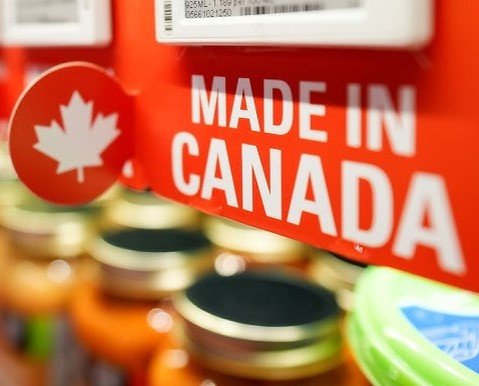Canadian Grocery Chains Sideline American Products as Boycott Gains Momentum
The ongoing trade dispute between Canada and the United States is now significantly impacting American businesses, as major grocery chains across Canada increasingly prioritize domestic products over those imported from the US. This shift in policy to boycott US products follows a surge in consumer patriotism in Canada, triggered by retaliatory tariffs and rising anti-US sentiments driven by former President Donald Trump’s frequent tariff threats and controversial political remarks.
The move towards highlighting local Canadian produce has intensified, with grocery chains visibly marking products sourced domestically through prominent labeling and dedicated promotional campaigns. Sobeys Inc., one of Canada’s largest supermarket groups with around 1,600 stores nationwide, indicated that its sourcing from American suppliers, which stood at approximately 12% of its total sales last year, is likely to decline sharply. Sobeys confirmed it has proactively been finding alternatives to US imports in response to growing consumer preference for Canadian-made products.
Similarly, Metro Inc., which operates nearly 1,000 stores across Ontario, Quebec, and New Brunswick, has introduced clear product labels and promotional materials highlighting locally sourced items. Longo’s, a popular family-owned grocery chain in the Greater Toronto Area, is also actively encouraging customers to choose Canadian products through online newsletters and in-store visibility strategies.
American Businesses Face the Heat
The ripple effect of these consumer-driven boycotts is being felt strongly by smaller and mid-sized American businesses. Ethan Frisch, founder and CEO of Burlap & Barrel, a New York-based company specializing in ethically sourced spices, noted receiving multiple communications from Canadian customers who explicitly state they will no longer purchase American goods. Frisch expressed significant concerns, highlighting how interconnected supply chains have complicated responses to such boycotts.
The consequences of this consumer shift have quickly penetrated different sectors of the American agricultural industry, raising fears among US producers and suppliers about sustained financial damage. Economic experts have noted that even partial or temporary boycotts could significantly affect the agriculture supply chain, from small farmers to large-scale exporters.
Impact on US Agricultural Exports
Canada remains the largest international market for high-value agricultural products from the US. However, this status is threatened by the current wave of boycotts and retaliatory tariffs. Larry Gerston, a professor at San Jose State University, has indicated that the extent of the damage will depend heavily on the duration and seriousness of the Canadian boycott. Gerston noted that Canadians’ strong national pride and their current level of offense toward US policies could magnify the economic repercussions on American producers.
Additionally, Jerry Nickelsburg, professor of economics at UCLA, raised concerns regarding broader implications, highlighting that the agriculture sector may not receive financial subsidies this time around. During Trump’s earlier tariff confrontations with China, American farmers received substantial government aid to offset losses; however, current budgetary constraints suggest such relief may not be forthcoming.
Canadian Consumers Driving the Boycott
Consumer behavior in Canada appears markedly changed following recent tariff announcements. Alisa Gorokhova, a Quebec resident, observed that almost immediately following the introduction of US tariffs, Canadian stores began prominently labeling local goods and removing American products—particularly non-essential items like alcoholic beverages—from shelves. Gorokhova noted a visible shift in consumer behavior, with shoppers actively scrutinizing product origins, displaying a clear preference for goods bearing the “Made in Canada” label.
Long-Term Consequences and Broader Trade Implications
The trade tensions, exacerbated by former President Trump’s frequent imposition and withdrawal of tariffs on Canadian goods, notably steel and aluminum, have significantly strained US-Canada economic relations. Trump’s rhetoric—referring to Canada humorously as the “51st state” and describing former Prime Minister Justin Trudeau dismissively as a “governor”—has further fueled Canadian displeasure, prompting consumers to actively boycott American products as a symbolic form of protest.
Experts warn that if these boycotts continue, American businesses could face long-lasting consequences. With Canadian grocery stores firmly emphasizing locally produced alternatives, the United States risks losing considerable market share in its largest agricultural export destination, potentially reshaping trade dynamics between the two nations for years to come.
Also see:
Trump Announces “Reciprocal Tariff” Plan, Targets India and Other Nations
Tesla Signs Mumbai Showroom Lease, Marks Entry into Indian Market
EU Unveils €800 Billion Plan to Strengthen Defence
—————————————————————
It would mean the world to us if you follow us on Twitter, Instagram and Facebook




